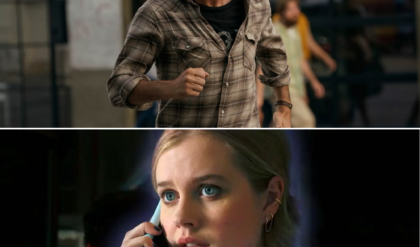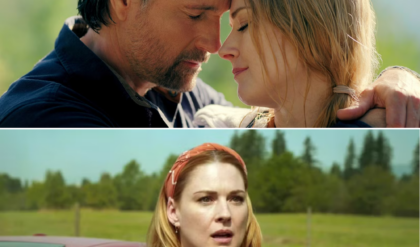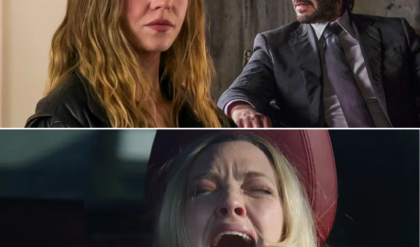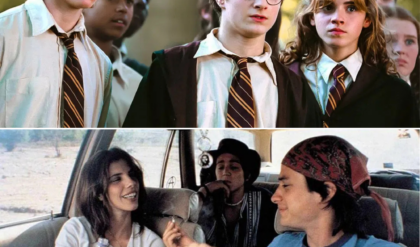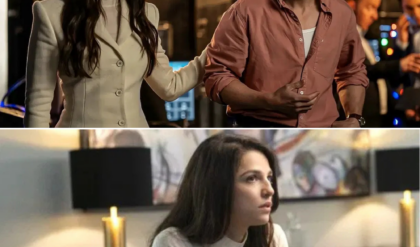The British miniseries Adolescence has become Netflix’s breakout hit of the season, and for good reason. Co-creator and writer Jack Thorne’s third riveting social drama to hit stateside streaming services in two months, after Acorn premiered Best Interests and Toxic Town arrived on Netflix in February, this saga of a 13-year-old boy charged with killing a female classmate speaks profoundly to the impact of social media and that oxymoron “incel culture” on sensitive young minds. The cast—led by co-creator and writer Stephen Graham (Peaky Blinders) and featuring remarkable performances from Top Boy’s Ashley Walters, Graham’s A Thousand Blows co-star Erin Doherty (The Crown, Chloe), procedural stalwart Christine Tremarco, and newcomer Owen Cooper as the diminutive defendant—is a hall of fame of undersung UK television talent. The show is also a technical achievement, with director Philip Barantini’s camera following the characters through each real-time episode in a single dynamic shot.

Spread out over more than a year, the story progresses in snapshots. The first captures the early-morning arrest of Cooper’s Jamie Miller and his father Eddie’s (Graham) awful realization, after viewing video evidence, that his boy is guilty. In the second, Walters’ DI Luke Bascombe and his partner, DS Misha Frank (Faye Marsay), take their investigation to Jamie’s school, an already hostile environment plunged into full-on chaos by the murder. The breathtaking third episode takes place almost entirely among two actors in a single room, where Doherty’s psychologist is tasked with evaluating Jamie. And the last looks in on the Millers more than a year after Jamie’s arrest, as they try to forget about their ordeal and subsequent pariah status for long enough to celebrate Eddie’s 50th birthday. A necessarily tense show, Adolescence offers few scenes of happiness or humor. But there’s one light moment in the finale that I just can’t get out of my head—probably because, in context, it’s also completely devastating.
The episode opens with matriarch and de facto peacekeeper Manda (Tremarco) frying up a full English breakfast for her husband. A homemade birthday card from Jamie, decorated with a skillful portrait of Eddie, allows the parents to enjoy a rare flash of pride in their child. But their fragile optimism is shattered when their daughter, Lisa (Amelie Pease), alerts them that someone has spray-painted “nonse” [sic] on the van that is both the vehicle Eddie uses for his plumbing business and the family car. In a rage, Eddie scrambles to scrub it off with soap and water, screaming at a pair of teens on bikes who taunt him as they ride by, to no avail. As the black pudding congeals, he loads everyone into the van for an emergency hardware store run.
It’s on this ride that the Millers loosen up a bit, making plans to salvage the day with a movie and Chinese food. When Lisa scrolls her phone for music to play, Manda pesters her daughter to cue up something by her childhood favorite, A-ha, which in turn prompts her to tell the story of one of her and Eddie’s first dates. He “decided to test me,” showing up in a “daft pink wig,” she recalls. “Everyone was laughing, but your dad never cared when people laughed at him.” They were around 13 years old, at a school dance, which of course meant that most of the kids were too shy to get their groove on. Finally, as “Take On Me” came over the speakers, Eddie got on the floor and started dancing all by himself. According to Manda, the ridicule continued; as Eddie remembers it, the other kids “were loving me Northern Soul dance moves.” Then, with all their peers watching, he slipped, fell on his nose, and got up with a face covered in blood. “Everyone was just pissing themselves,” Manda says. “And then he said, ‘I’m bleeding here!’”
The exclamation became a running joke at school. Yet, almost four decades later, that evening remains a fond, funny memory for the couple; Eddie laughs self-deprecatingly throughout Manda’s anecdote. His misadventure brought them closer together, as Manda kept the boy who would grow up to be her husband company on the sidelines of the dance. When he dropped her off at home, he says—to their daughter’s mortification—she “snogged the gob off me.”
Manda’s anecdote functions as both confirmation that a monster like Jamie could be the product of a loving home and the eye of the episode’s storm—a reprieve between Eddie’s angry response to the graffiti and his burst of violence when the boys on bikes cruise by the hardware store. More than that, though, it’s a vision of the relatively wholesome rites of passage Jamie’s parents enjoyed at his age. Yes, 13-year-old Eddie made a fool of himself that night, and his classmates yelled “I’m bleeding here!” at him for years afterward. But it was all in fun. He was confident enough to shrug off the laughter. The incident also cemented his age-appropriate relationship with Manda, whose affection clearly helped ease the sting of embarrassment.
Imagine how the night might have played out differently, though, had it taken place in the present. Some kid with a phone would inevitably have recorded Eddie’s fall and posted it on social media, where his peers could pile on with mean comments Eddie would not only see, but also know that all his friends, including Manda, were reading. Maybe the video would go viral, leaving him open to ridicule from children and adults the world over. Maybe someone would turn him into a Bleeding Boy meme that would linger online for decades. (Remember Star Wars Kid?) Maybe Manda, also just 13 and thus susceptible to social pressure, would break up with him because she didn’t want to be a punchline by proxy. Maybe, just as Jamie had seen topless photos of his victim, Katie, that she’d sent to a boy in their class, Eddie would’ve gotten mad enough about the whole ordeal to share images of Manda that would also qualify as child pornography—and also possibly live forever in the darkest corners of the internet.
Eddie and Jamie are different people, to be sure. In his face-off with Doherty’s Briony, we learn that Jamie isn’t “sporty” like his dad, and that probably has something to do with his low position in the junior high social hierarchy. Other qualities Eddie has apparently failed to pass on to his son include charisma and warmth. Yet father and son share hair-trigger tempers. Eddie’s brief but terrifying outbursts in the finale echo Jamie’s sudden verbal assaults on Briony; he’s tiny, but the force of his rage rattles her. In both cases, it’s the women who surround these angry male characters who are burdened with either defusing the situation or enduring it. Their discomfort, their fear, their embarrassment—none of these things seem to matter to aggressors consumed by their own emotions. In Katie’s case, being the object of Jamie’s fury cost her her life.
The gulf between Jamie and Eddie is generational. (We also know that Eddie’s father was physically abusive, in an era when it was more socially acceptable for patriarchs to use violence to keep their families in line.) Thorne, who is just a few years younger than Eddie would be, has written that “the key difference between” himself at 13 and Jamie is that “he had the internet to read at night whereas I had Terry Pratchett and Judy Blume.” Jamie might’ve been the same angry, bullied kid had he come of age in the 1980s. But he wouldn’t have had the virulent misogyny of a “manosphere” that radicalizes pubescent boys in one ear and, in the other, the public taunts of classmates who comment on his Instagram calling him an incel. High on hormones and thrown into a precarious pecking order at school, teens have always had it rough. Every generation has its own particular challenges. What’s so haunting about Manda’s reminiscence is its implication that, given different circumstances, Jamie’s story—and Katie’s—could have had a much happier ending.
